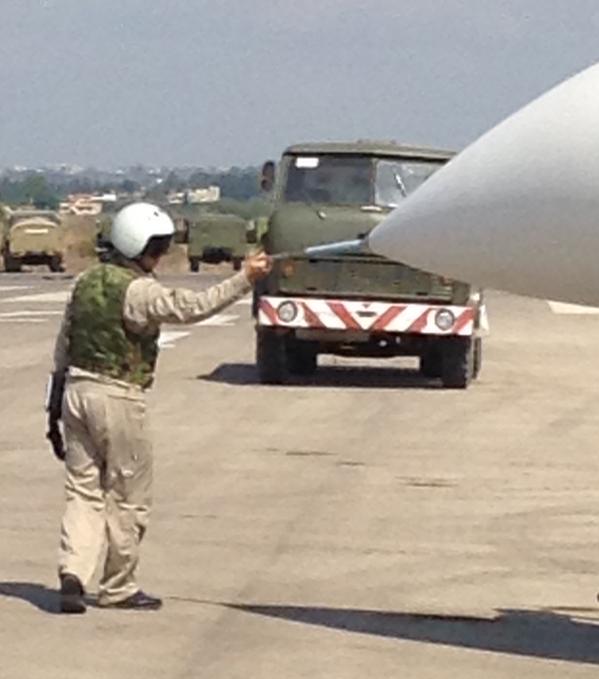The Syrian Arab Army (SAA) – in coordination with the National Defense Forces (NDF) and the Syrian Social Nationalist Party (SSNP) – are preparing for a large-scale ground offensive inside the Al-Houla and Al-Rastan Plains of northern Homs after a one year hiatus from this front.
==================
Russia’s deputy chief of staff, Gen. Nikolay Bogdanovsky, accompanied by a large military delegation, arrives in Israel for a two-day visit on Tuesday, Oct. 6, to discuss increased coordination between the two militaries. However, Moscow seems to be sending Jerusalem an altogether different message: Friday, Oct. 2, the Russian Defense Ministry announced the surprise deployment of Navy cruiser, the Moskva, armed with 64 advanced anti-aircraft missiles S-300 ship-to-air missiles opposite the Syrian coastal town of Latakia.
DEBKAfile’s military sources point out that Russia, without saying so publicly, has thus created an effective no-fly zone over most of Syria, most of northern Israel, including the Golan, as well as southern Turkey, for US aircraft based there for air strikes in Syria; Cyprus, the site of British air force bases; and Jordan.
Since 2012, The Obama administration has been discussing the possibility of establishing no-fly zones in northern and southern Syria on a number of occasions, but has shelved the plan whenever a decision was imminent. Now, with one move, Moscow has imposed a no-fly zone over Syria.
The presence of the wide-ranging S-300s means that the Turkish, British, Israeli and Jordanian air forces will need to coordinate their aerial operations in Syrian or Lebanese airspace with Russia, or face the risk of their planes being shot down.
In the view of DEBKAfile’s military sources, the only aircraft capable of evading those advanced missiles are stealth planes. Neither the Israeli, British, Jordanian or Turkish air forces, nor the US squadron in Turkey consisting of F-16 fighters, have such aircraft at their disposal.
The S-300 has a range of 150 kilometers and can shoot down any type of missile, including cruise missiles, as well as planes.
If US President Obama truly wanted to deal effectively with Moscow’s military moves in Syria, besides saying that Russia is bound to fail, he would have ordered the deployment of US stealth fighters to Turkey and Israel. However,may have been held back from this step by fear of antagonizing Iran, which has so far delayed sealing the nuclear agreement with the world powers by putting it to vote in parliament.
The presence of Moskva off the shores of Syria and close to northern Israel creates a new situation that will very likely be discussed in the talks that start Tuesday in Tel Aviv between Russia’s deputy chief of staff and his Israeli counterpart, IDF Gen. Yair Golan.
Although Russian President Vladimir Putin promised Israeli Prime Minister Binyamin Netanyahu during their summit in Moscow on September 21 not to allow S-300 missiles reach the hands of the Syrian military, he made no promises about positioning them on a Russian warship in the Mediterranean facing Syria and northern Israel. .
Our military sources point out that Russian air strikes have not been confined to any single area so far, but the injection of S-300s into the war arena widens the Russian air force's options.
In an interview with CNN on October 4, Prime Minister Netanyahu described how the Russian operation in Syria had affected relations with Moscow. "We don't want to go back to the days when, you know, Russia and Israel were in an adversarial position,” he said. “I think we've changed the relationship. And it's, on the whole, good.” He added that Israel’s close relations with the US were in a completely different and special category.
When asked whether he thought Russia’s intervention would cause instability in the region, he seemed to avoid giving a detailed response, only saying, “I don't know. I think time will tell”.
However, on the topic of the transfer of advanced weaponry to Hizballah, the prime minister was very clear. ”If anybody wants to use Syrian territory to transfer nuclear weapons to Hezbollah, we'll take action,” he said.
It marked the first time for an Israeli prime minister to speak publicly on the possibility that the terrorist organization could acquire atomic weapons.
Last edited by Solncepek on Mon Oct 05, 2015 7:37 pm; edited 1 time in total














